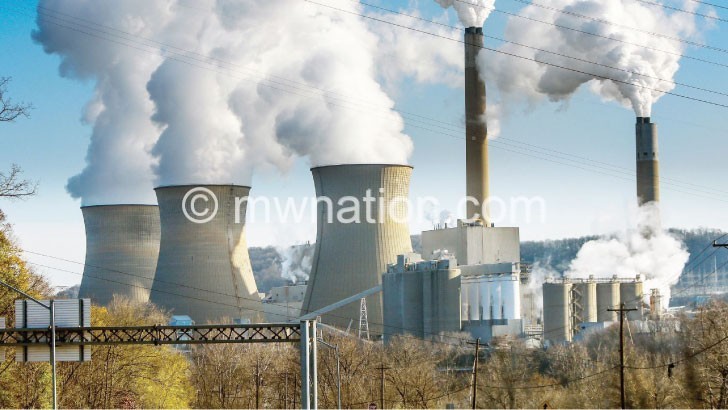Capital Hill’s dirty secret
Just five years ago, President Peter Mutharika was among world leaders who resolved to end poverty and environmental ruin by ensuring that everyone uses clean and sustainable energy by 2030.
But Malawi is racing to the coal seams, snubbing the 17-point Sustainable Development Goals (SDGs) they adopted at the United Nations (UN) headquarters in New York.
This chips away at global demands to leave fossil fuels underground to reduce air pollution and climate change.

During 2018 UN climate change talks in Katowice, Poland, Malawi government officials sneaked to the coal-rich city’s smoky electricity producers to learn how to sustainably burn coal for energy at Kam’mwamba in Neno District.
Last month, follow-up climate change negotiations in Madrid, Spain, amplified Capital Hill’s rebuff of the growing demands to halt the construction of new coal-fired power plants.
“The 300-megawatt Kam’mwamba Coal-fired Power Plant will take shape, no doubt about it. We will start burning coal for energy,” Minister of Natural Resources, Energy and Mining Bintony Kutsaira told journalists in the Spanish capital.
‘Malawi is suffering’
Bizarrely, the minister was speaking at a conference where UN Secretary-General Antonio Guterres urged countries to keep coal, petroleum and other fossil fuels in the ground to reduce global warming.
On the same stage, Mutharika demanded greater financial inflows from the largest emitters—the wealthy nations—to help least developed countries to cope with effects of climate change.
Kutsaira says Malawi has the right to develop like coal-electrified superpowers in Europe, America and Asia.
“Malawi is suffering because, for many years, we have over-depended on energy from rivers, which is not sustainable anymore. We didn’t have a coal-fired power plant. No country has developed by hydropower alone. Britain, the US, China and Japan all developed because of coal,” he says.
The minister says wealthy economies will collapse if they stop burning coal.
He states: “They have developed their population and we also have to develop our people.
“So, if you ask me about the Kam’mwamba project, we will do it and we must do it. No doubt about it. We will rely on coal power until we find reliable alternatives.”
He brags that the country “probably has no emissions to reduce” although “we are the worst-hit by climate-related disasters fuelled by massive emissions from developed countries”.
The country is gradually turning to fossil fuels to beat persistent blackouts and skewed access, with just 12 percent of the population using electricity for lighting.
Mutharika switched on diesel-powered generators in 2018 and the coal-fired plant awaiting funding from a China bank is seen as a quick fix to energy poverty.
But even China, the world’s worst polluter, has been cancelling new investment in coal power to tackle climate change and clean air.
Engineer Collen Zalengera, from Mzuzu University’s Centre of Excellence for Energy Studies, says Kam’mwamba could strengthen power supply, but the government must harness existing technologies to reduce the environmental hazards.
But environmentalists warn against false fixes to carbon emissions, saying burning coal contradicts the Paris Agreement to reduce global warming to below two degrees Celsius.
Capital Hill’s desperation for coal power is endorsed by the revised National Energy Policy. The country’s roadmap to sustainable energy for all also promotes renewable energy sources to supplement hydropower.
Paris pact on fire
Sustainable Energy activist warn Malawi against taking the path taken by major polluters.
Community Energy Malawi executive director Edgar Bayani says harnessing renewable technologies, especially abundant sunshine and wind, could help beat energy gaps.
He explains: “Just because others did it wrongly does not justify us to go the same route. We surely can do great exploiting our renewable energy potential.
“In fact, promoting decentralised renewable energy projects such as solar mini-grids has potential to accelerate connection while also reducing the pressure on the grid.”
Civil Society Network on Climate Change coordinator Julius Ng’oma says the growing appetite for coal is ironic as Malawi is a party to both the UN Framework Convention on Climate Change and the Paris Agreement, which mandate countries to contribute to reducing emissions and global warming.
He said: “In fact, Malawi has also developed the Nationally Determined Contributions (NDCs) communicating to the world how we want to contribute to reducing our emissions, no matter how small they may be.
“It is important to fully subscribe to sustainable development principles, meaning we have to conform to the development trajectory that will not endanger or put the future of our country and the world in jeopardy. Pursuing coal is not only against the principles of environmental sustainability but also international obligations,” he said.
Point of no return?
To Guterres, the world stands at a critical juncture in its collective efforts to limit “dangerous global heating” in the new decade.
“Do we really want to be remembered as the generation that buried its head in the sand, that fiddled while the planet burned?” asks the UN Chief in a call to “the path of hope, resolve and sustainable solutions” where “more fossil fuels remain where they should be— in the ground”.
He states: “That is the only way to limit global temperature rise to the necessary 1.5 degrees by the end of this century,” he said.





